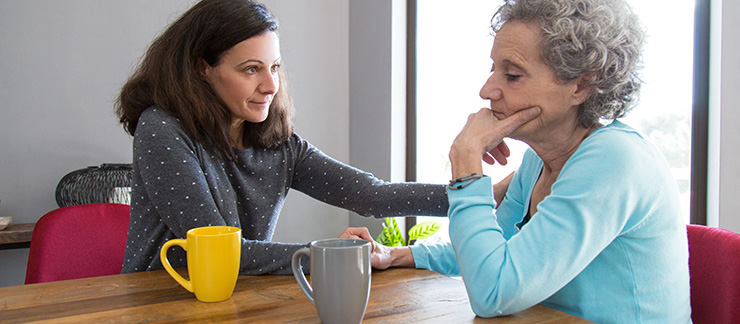
Helping Your Senior Loved One Manage Aging-Related Loss
Aging-related loss is, unfortunately, a common experience for seniors, challenging various aspects of their lives. From the loss of loved ones to shifts in daily routines and an increasing need for in-home assistance, these changes can deeply affect their lives.
Age-related life changes can lead to depression, grief, frustration, and anxiety. If left unnoticed or untreated, this distress can increase the risk of health complications such as high blood pressure, poor nutrition, and sleep disorders.
Understand How Loss Accumulates with Age
“Age-related loss” is a natural part of aging but is not always tied to the death of a spouse, family member, or friend. Seniors may experience and fear other losses, such as:
- Hearing or vision
- Mobility
- Memory
- Driver’s license
- Independence
- Safety at home
- Friendships and group activities
- Pride in profession, fitness, or appearance
Understanding why your loved one isn’t coping well can make a difference in how you respond to frustrations, such as outbursts of irritability or apathy for personal hygiene.
Related reading: How Widowhood Can Affect Seniors
Acknowledge Their Emotions (and Yours)
The role reversal that comes with family caregiving can cause your relationship to shift along with your duties. The increasing tasks can lead to caregiver burnout if you feel obligated to do everything on your own.
Talk with your aging parent about how you both feel—this conversation should feel informal and non-judgmental. Try these tips to start a conversation with your loved one.
- Find new ways to share feelings
Ask your loved one to choose three words describing how they’re feeling. - Redirect negativity with positive questions
For example, prompt your loved one to share stories about a friend they’ve lost recently. - Use a journal to promote mindfulness
Most bookstores carry printed journals, or you can try a free digital journaling app. - Work through losses together
Give the emotions a creative outlet with art, music, gardening, or another shared interest. - Curate a family legacy project
This could be a scrapbook, a collection of oral histories, genealogy research, a cookbook filled with family recipes, or a digital slideshow of family photos.
The next time a tense situation arises, remember harsh words or a sarcastic tone are rarely effective. Instead, try to turn it into an opportunity for your loved one to express their feelings in a safe, familiar atmosphere. Show them their opinions and experiences still matter.
Related reading: Elderspeak: What It Is and Why It Can Be Harmful
Promote Well-Being With Healthy Routines
You’ve likely heard your loved one say things like, “I’ve done it this way all my life” or “I’m too old to change.” A senior with a stubborn or controlling personality may double down on those traits when faced with new dietary limitations or a complicated medication regimen.
Don’t attempt to force or persuade your loved one into a “new normal.” Instead, help them adapt to new habits and routines:
- Steer them away from convenience foods
Many seniors living alone rely on frozen meals or canned products with questionable nutritional value. - Introduce change gradually
For example, replace salt with a no-salt seasoning or suggest a short walk to a neighbor’s house instead of an exercise class. - Involve them in decision-making
Offer choices instead of instructions (e.g., “Do you want to go for a walk or do chair exercises today?”). - Find tactful ways to enforce non-negotiables
Soften reminders (e.g., “Let’s brush teeth and take care of medicine first, then you can relax and watch your show”). - Let tech do some of the work
Introduce your senior to smartphone apps for medication reminders, grocery lists, meal planners, or fitness trackers. - Avoid taking control at appointments
Unless hearing or memory loss interferes, let your loved one talk with care providers directly to maintain their sense of control and personal responsibility for their health.
Related reading: Activities That Stimulate Your Aging Senior’s Brain
Lighten the Mood with Laughter
The adage “laughter is the best medicine” is actually supported by science! A quick online search for “laughter therapy” pulls up scores of studies and articles that show positive impacts on mental and physical wellness:
- Boosts oxygen levels
- Lowers blood pressure
- Triggers stress-reducing hormones
- Exercises the diaphragm muscles
- Stimulates cognitive function
- Alleviates feelings of isolation and loneliness
There’s even a group for healthcare providers called the Association for Applied and Therapeutic Humor (AATH). Silly puns or riddles can defuse tension or revive a conversation. Infuse some joy in your caregiving relationship with one or more of these fun ideas:
- Amass a written collection of your loved one’s best “dad jokes” or “mom-isms”
- Start a new family tradition, such as regular movie or game nights
- Choose a classic TV comedy like “I Love Lucy or “The Carol Burnett Show” to binge-watch together
Humor is free, low risk, and requires minimal effort—and the benefits can be highly contagious!
How a Professional Caregiver Can Help
Professional caregivers can provide vital support during emotionally challenging times. In partnership with you, Visiting Angels can help your loved one cope with age-related life changes in a healthy way.
Through a cheerful demeanor and a helping hand for non-medical needs, we can step in to do the following:
- Recognize signs of depression and anxiety
- Assist with daily personal care tasks
- Offer medication reminders
- Help with meal planning and grocery shopping
- Encourage physical activity
- Provide companionship and respite care
We offer a wide array of home care services customized to your loved one’s specific needs—and our caregivers are experts in positive energy.
Contact us today. A care consultant with your local Visiting Angels office can help you create an affordable support schedule that will lighten your load.


